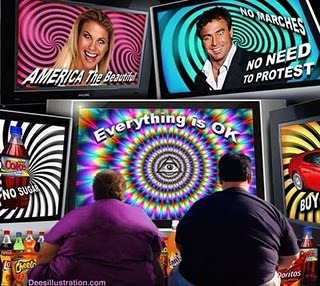
In 1967, George Gerbner, a Hungarian professor of Communication, studied the effects of television in society and proposed an idea that is today recognized as the “Cultivation Theory”. In this theory, Dr. Gerbner proposes that “television cultivates, or promotes, a view of social reality that is inaccurate but that viewers nonetheless assume reflects real life.” In other words, television is overwhelming us with information to the point where our perception of reality has been distorted. Everyday, we turn on our televisions and stare at a synthetic yet coherent reality. Cultivation Theory proposes that the more TV we watch, the more it influences in the way we perceive the world.
It is important to define what cultivation means in this context. According to the theory, cultivation is the “cumulative process by which television fosters beliefs about social reality.” This means that a single show does not have an influential effect on you, but the continuous engagement with television and other mass communication agents may have a big impact in your life.
So what’s the problem with this synthetic reality?
Well, for one thing, television portrays an extremely violent world. Fifty-seven percent of television entertainment programs include some sort physical, emotional, or psychological violence. In contrast, only 10% of reported crimes in the nation are violent in nature, and the average person has 1 in 200 chance of being involved in a violent crime during any given week. Furthermore, violence is not only shown the programs that entertain teens and older generations. Studies report that “28% of children’s show include four or more acts of violence, 75% of them do not carry the FV (Fantasy Violence) rating. In the US, the average 18-year-old has viewed 200,000 separate acts of violence on TV, including 40,000 separate murders.

At this point of the theory, Dr. Gerbner points out a singularity that he calls “Mean World Syndrome”. This phenomenon happens when the violence-related content of mass media convinces viewers that the world is more dangerous than it actually is, and prompts a desire for more protection than is warranted by any actual threat.
But why is television able to permeate in every demographic group of society? There are two reasons:
1- Mainstreaming.
Mainstreaming is TV’s ability to stabilize and homogenize views within a society. As previously stated, if heavy viewers see violence on the TV all the time, they may come to believe that violence is common. When they interact with light TV users, their attitudes may affect the attitudes of others, allowing the mainstreaming process to happen.
2- Resonance
Resonance is the extent to which something is congruent with personal experience. For example, a person who has experienced violence will likely identify with TV violence. This greater identification heightens its impact, so we participate in creating the drama and its impact on our attitudes and actions.
So to wrap it up, Cultivation Theory argues that commercial TV distorts our perception of reality, fostering beliefs and attitudes that are taken from a synthetic world through our screens. One effect that TV has had on us is the Mean World Syndrome, where we see the world as a far more dangerous place than in actually is.
